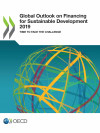The OECD report offers a general overview of financing for sustainable development, highlighting severe shortcomings in the flow of private and public resources to developing countries. In preparing their integrated national financing frameworks (INFFs), countries will need to take into account trends in financial resources. Chapter six deals with emerging tools and frameworks for financing sustainable development, including INFF.
The financing for sustainable development agenda promises to bring together more actors than ever before – from businesses, governments, philanthropists, and remitting households – to address the world’s most pressing problems and achieve the Sustainable Development Goals (SDGs). Yet, in spite of this promise, the financing for sustainable development gap is growing. While needs continue to increase, resources available to developing countries have been constrained and in some cases have been declining, as illustrated by the recent drop in foreign direct investments. New financial instruments and interactions have yet to mobilise much-needed new resources in sufficient volumes. And despite significant advances, we do not yet fully understand the opportunities and risks faced by the various actors in this complex new global financing system.
This report sounds a wake-up call - to fulfil the commitments of the 2030 Agenda, and lift hundreds of millions of people out of extreme poverty. The international community needs to maximise the development footprint of existing and future resources, thereby “shifting the trillions” towards the SDGs. The first in a series, this report charts a forward path for the changes required in measurement, policies, and operations to achieve these ambitious objectives.
